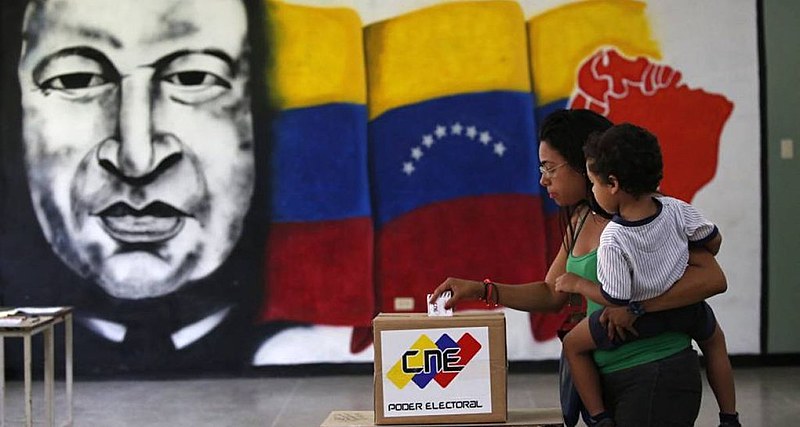
Published 03/06/2024 17:37
Venezuela announced this Tuesday (5) that its presidential elections will be held on July 28, as agreed between the government and the opposition. The chosen date coincides with the birthday of Hugo Chávez, the country’s former president, adding symbolic meaning to the electoral process. The date represents a change in relation to the traditional election period, which usually takes place in December.
The expectation is that current president Nicolás Maduro will seek re-election for a new six-year term, although he has not yet formalized his candidacy. The president of the National Electoral Council (CNE), Elvis Amoroso, announced that the period for registering candidates will be from March 21st to 25th, with the electoral campaign scheduled to take place from July 4th to 25th.
María Corina’s betrayal
The choice of the election date comes after a series of legislative proposals, this being the one that received the greatest support from political organizations during a consultation promoted by the National Assembly. However, the opposition faces significant challenges, especially with the disqualification of prominent candidates, such as María Corina Machado, who won the main opposition coalition’s primaries but had her candidacy rejected by the Superior Court of Justice.
According to the sentence, one of the reasons is participation in the corruption plot orchestrated by former opposition deputy Juan Guaidó, promoting the criminal blockade of the country. Furthermore, for participating in the plundering of companies and wealth of the Venezuelan people abroad, highlighting cases such as the handover of the company Citgo to the Canadian company Crystallex. This action caused damage to the country’s assets of approximately 32.5 billion dollars. Also for the delivery of the Monómeros company, which was bankrupt, as well as the kidnapping and theft of 31 tons of Venezuelan gold, which are in the Bank of England.
The sentence also establishes that Machado, together with Guaidó and others, requested the application of sanctions and economic blockade against the country, generating the kidnapping of 4,000 million dollars retained in the international banking system. These measures made it impossible for the population to purchase certain medications, causing harm to their health.
In 2023, a Special Commission of the National Assembly (AN) investigated the scope and responsibilities of former US President Donald Trump’s confessions against Venezuela, presenting a report in which the participation of some opposition leaders in destabilization plans was demonstrated. and theft of property. resources of the South American country.
According to the president of that committee, deputy Pedro Infante, the documents presented show the crime of treason, with María Corina being one of those involved from the opposition party, since in an organization’s statement, signed by her, she was asked to invade by foreign forces against Venezuela.
The decision by the National Electoral Council also allows the government to partially comply with an agreement made with part of the opposition the previous year, which stipulated that the presidential elections would take place in the second half of 2024. However, the exclusion of candidates prohibited from running, such as Machado , is used by opponents of the Maduro Government as “concerns about the transparency and legitimacy of the electoral process”.
Furthermore, the arrest of activist Rocío San Miguel and tensions over the Essequibo region have increased international concerns about the electoral process and stability in Venezuela. The Public Ministry announced in February the arrest of Rocío, who had an arrest warrant for allegedly being involved in the conspiracy and attempted assassination of President Nicolás Maduro, known as the White Bracelet.
Barbados Agreement
The meeting between President Nicolás Maduro and former Brazilian President Luiz Inácio Lula da Silva, during the Summit of the Community of Latin American and Caribbean States, resulted in a request from Maduro for the UN and CELAC to send observation missions to Caracas. This request comes amid international tensions, with the recent expulsion of employees from the United Nations High Commissioner for Human Rights and the suspension of its operations in the country by the Venezuelan government.
The fixing of the election date provoked diverse reactions, including from the Brazilian government, where it was seen as a relief. The scheduling is in line with the terms of the Barbados Agreement, signed between the Venezuelan government and the opposition in October last year. However, some members of the Brazilian government expressed concern about the proximity of the elections, considering it “too soon”, given the existence of political impasses in the country.
President Luiz Inácio Lula da Silva had a conversation with Nicolás Maduro in early March, in which the Venezuelan elections and the Barbados agreement were discussed. Lula expressed concerns about the political situation in Venezuela and addressed issues such as Maduro’s aggressive rhetoric regarding Essequibo, as well as Venezuela’s debt with Brazil and the fight against illegal mining in the region.
As the election date approaches, Venezuela faces significant challenges, both internal and external, as it seeks to establish a transparent and inclusive electoral process. The outcome of these elections will have repercussions not only for the Venezuelan people, but also for political stability in Latin America as a whole.
Source: vermelho.org.br

